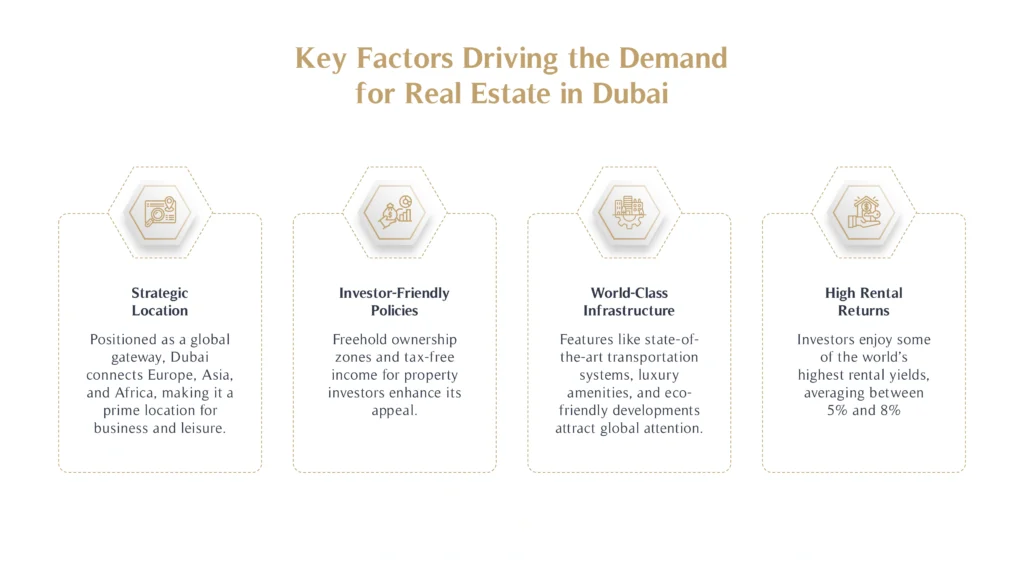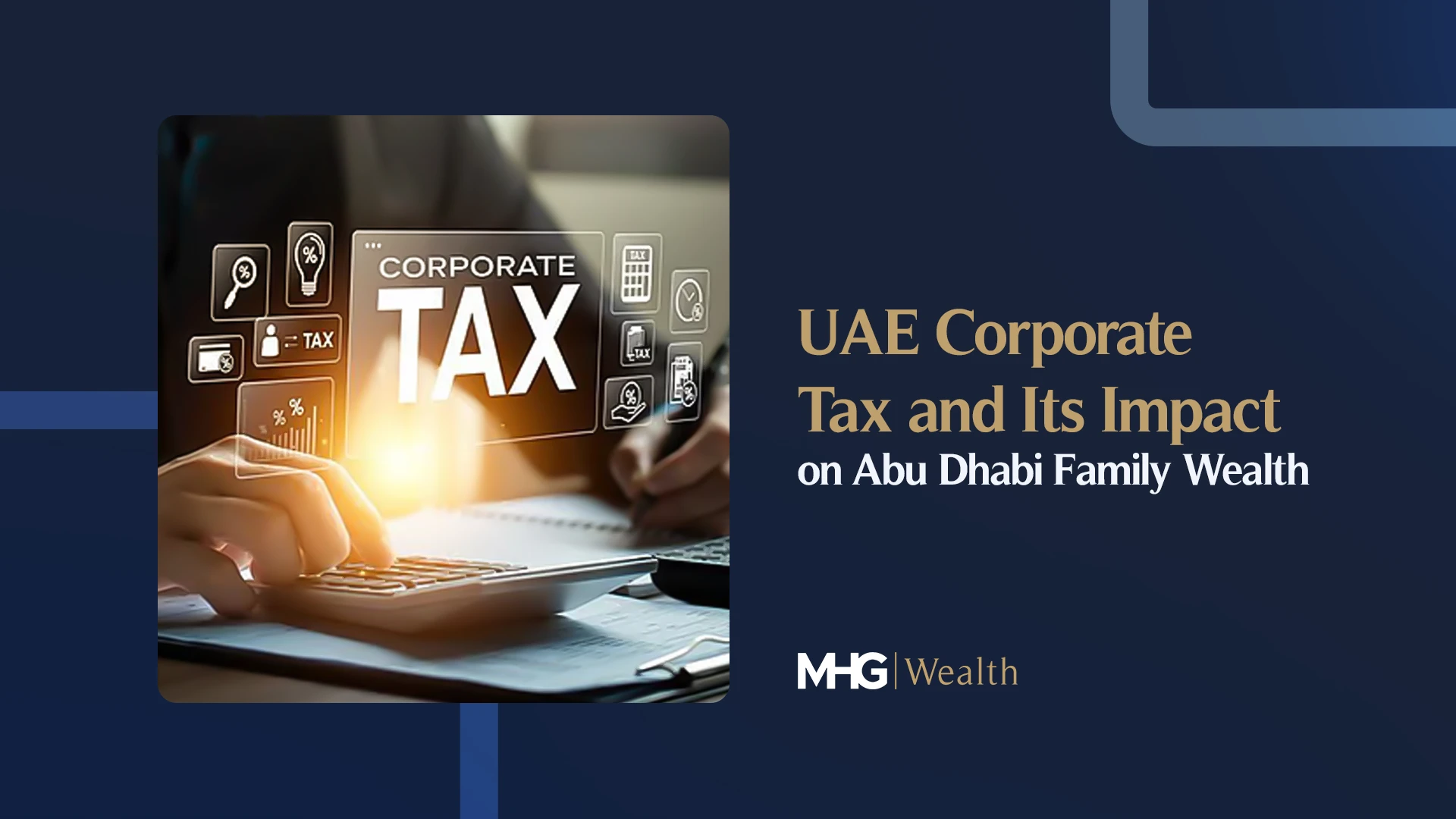Dubai’s property market is booming, attracting investors worldwide with its blend of modern infrastructure, tax-free environment, and exceptional returns. As one of the most dynamic real estate markets globally, Dubai offers opportunities for both experienced and first-time investors.
However, successfully navigating property investment requires more than just identifying prime real estate, it also involves understanding the various financing options available. Whether you’re looking to purchase a high-rise apartment in Downtown Dubai or a waterfront villa in Palm Jumeirah, knowing how to finance your investment is critical to making the most of this lucrative market.
In this article, we’ll provide a comprehensive guide to the various financing solutions for property investment in Dubai. Covering everything from mortgages to alternative loans and actionable strategies to secure funding
Understanding Dubai Investment Properties
Types of Investment Properties in Dubai
Dubai’s real estate market caters to a wide range of investors, offering:
- Residential Properties: Apartments, villas, and townhouses in premium locations like Dubai Marina and Palm Jumeirah.
- Commercial Properties: Office spaces and retail units for high-demand businesses in business districts such as DIFC and Business Bay.
- Luxury Properties: High-end options including branded residences and waterfront villas.
- Off-Plan Properties: Pre-construction investments with developer-backed payment plans
Key Factors Driving the Demand for Real Estate in Dubai
Several factors contribute to the high demand for real estate in Dubai:
- Strategic Location: Positioned as a global gateway, Dubai connects Europe, Asia, and Africa, making it a prime location for business and leisure.
- Investor-Friendly Policies: Freehold ownership zones and tax-free income for property investors enhance its appeal.
- World-Class Infrastructure: Features like state-of-the-art transportation systems, luxury amenities, and eco-friendly developments attract global attention.
- High Rental Returns: Investors enjoy some of the world’s highest rental yields, averaging between 5% and 8%
Legal Framework for Foreign Investors
Dubai’s regulatory framework fosters a transparent and secure environment for international property buyers:
- Freehold Zones: Non-UAE nationals can own properties outright in designated areas such as Downtown Dubai and Jumeirah Lake Towers.
- Investor Visas: Real estate investments of AED 750,000 or more may qualify investors for long-term residency visas.
- Regulatory Oversight: Institutions like the Real Estate Regulatory Authority (RERA) ensure transparency and protect investor rights.
Financing Options for Property Investment in Dubai
Overview of Property Mortgages in Dubai
Property mortgages are one of the most popular ways to finance real estate investments in Dubai. With flexible terms and competitive rates, they allow investors to access high-value properties while managing their cash flow effectively.
Types of Mortgages Available
- Fixed-Rate Mortgages: These mortgages come with a stable interest rate over a defined term, offering predictability in monthly payments. Ideal for investors who value consistency and want to avoid fluctuations in financial obligations.
- Variable-Rate Mortgages: Interest rates in these mortgages fluctuate with the market. While they can start lower than fixed rates, they may rise over time, making them suitable for those comfortable with some financial flexibility.
- Offset Mortgages: A unique type of mortgage where your savings account is linked to the loan. The balance in your account reduces the interest payable on your mortgage, making it an efficient choice for those with significant cash reserves.
Eligibility Criteria for Obtaining a Mortgage
Lenders in Dubai have specific requirements for mortgage approval:
- Residency Status: Both residents and non-residents can apply, but terms often differ. Expats are typically offered a loan-to-value (LTV) ratio of up to 75%.
- Income Level: A minimum monthly income (AED 15,000 for most lenders) is required to demonstrate repayment ability.
- Credit History: A strong credit score improves approval chances. Lenders assess your financial behaviour and creditworthiness.
- Property Type: The property being purchased must fall within a designated freehold area.
- Age: Borrowers should generally be under 65 at the loan’s maturity.
Property Loans in Dubai
Property loans provide another financing option, offering flexibility for various investor needs.
Differences Between Mortgages and Property Loans
- Purpose: Mortgages are secured against the property being purchased, while property loans may be unsecured or used for purposes like renovations or short-term financing.
- Loan Term: Mortgages often have longer repayment periods (10-25 years), while property loans are typically shorter (1-7 years).
- Interest Rates: Property loans may have higher interest rates due to the lack of security compared to mortgages.
Key Lenders and Their Offerings
Dubai’s financial institutions provide tailored products for property investors:
- Emirates NBD: Offers expat-friendly mortgage products and specialised property loans for large projects.
- Mashreq Bank: Known for competitive rates and fast approvals, with flexible terms for investors.
- Dubai Islamic Bank: Provides Sharia-compliant financing options for property purchases and development.
- HSBC UAE: Focuses on global investors with a strong financial background, offering multi-currency loans for Dubai properties.
Steps to Secure Financing for Real Estate Investment
Here is a detailed run-down of how to invest in Dubai real estate:
- Research the Market and Identify Suitable Properties
Thorough research is the foundation of successful property investment. Start by understanding Dubai’s real estate landscape:
- Popular Locations: Areas like Dubai Marina, Downtown Dubai, and Jumeirah Lake Towers attract strong rental demand and capital appreciation.
- Market Trends: Analyse property price trends and rental yields to identify lucrative opportunities.
- Developer Reputation: Choose properties developed by reputable companies to ensure quality and timely delivery, especially for off-plan projects.
- Understand the Costs Involved in Property Investment
It’s essential to factor in all associated costs beyond the purchase price:
- Transaction Fees: These include the 4% Dubai Land Department (DLD) registration fee and agent commissions (typically 2%).
- Service Charges: Annual maintenance fees vary based on the property type and location.
- Mortgage Costs: Consider down payments (usually 25-30% for expats), interest rates, and processing fees.
- Insurance: Property insurance is recommended for risk management.
Getting a Loan for Real Estate Investment
- Prepare Necessary Documentation
Before applying for a loan, gather the required paperwork to streamline the approval process:
- Proof of Identity: Valid passport and residency visa for expats.
- Income Documents: Salary certificates, bank statements (6-12 months), and audited financials for self-employed applicants.
- Credit History: A detailed credit report demonstrating your financial responsibility.
- Property Details: A sale agreement and property valuation report.
- Tips for Improving Loan Approval Chances
Boosting your chances of securing financing involves:
- Building a Strong Credit Profile: Pay off outstanding debts and avoid late payments to enhance your credit score.
- Saving for a Larger Down Payment: A higher initial deposit lowers the lender’s risk, improving your approval odds.
- Maintaining a Low Debt-to-Income Ratio: Limit existing financial obligations to ensure you meet the lender’s affordability criteria.
- Seeking Pre-Approval: Getting pre-approved shows sellers and agents you are a serious buyer, speeding up the purchase process.
Financial Options To Get A Loan For Building Rental Properties
- Financing Construction vs. Purchasing Existing Properties
- Construction Financing: Ideal for investors building from scratch. Lenders may provide loans in stages, aligned with the construction timeline. Benefits include customised property features and potentially higher returns.
- Purchasing Existing Properties: Easier to finance and generates immediate rental income. Best for investors seeking steady cash flow and lower risk.
- Potential Returns on Investment from Rental Properties
Rental properties in Dubai offer consistent income and long-term growth:
- Rental Yields: Prime areas deliver rental yields between 5-8%, higher than many global markets.
- Capital Appreciation: Properties in well-developed or emerging neighbourhoods often see significant value appreciation.
- Tourism Demand: High demand for short-term rentals, especially in locations like Palm Jumeirah, ensures a steady income stream.
Conclusion
Dubai’s property market is ripe with opportunities, but the key to maximising returns lies in understanding your financing options. Whether you choose a traditional mortgage, a property loan, or a developer’s payment plan, each path offers unique benefits tailored to different investment strategies.
As you navigate Dubai’s dynamic real estate landscape, remember to seek expert advice and carefully evaluate all financing options. A well-informed approach will not only secure your investment but also position you to take full advantage of Dubai’s ever-expanding property market.
Ready to turn your property investment dreams into reality? The time to explore Dubai’s real estate market is now.






